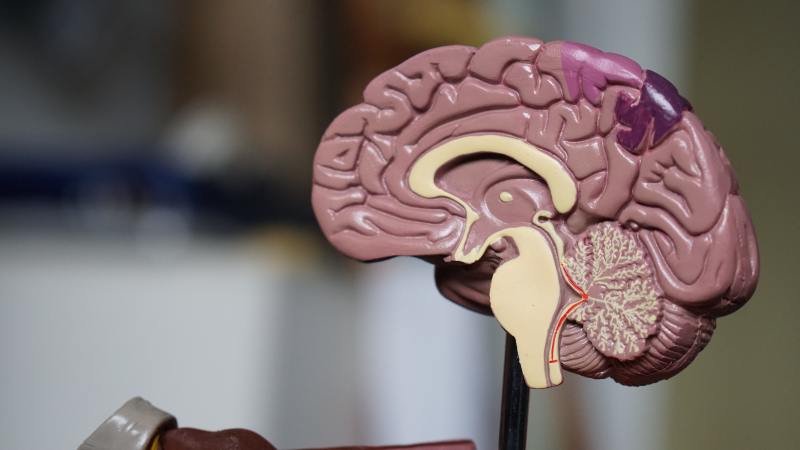Brain health is the foundation for some of today’s most prevalent health concerns, including memory, focus and other cognitive functionds; mood and behavior; stress and anxiousness; and sleep issues. Daniel G. Amen, MD uses the BRIGHTMINDS mnemonic as a way of organizing 11 major risk factors that threaten brain health.
Here’s the breakdown of the BRIGHTMINDS Risk Factors:
B – Blood flow
This includes poor circulation, poor blood pressure control, lack of exercise, and sedentary lifestyle. We can support bloodflow nutritionally with arginine-rich foods like beets, turkey, chicken, beef, salmon, watermelon, and spinach. Vitamin C rich foods also support healthy circulation and include cherries, citrus fruits, kiwi, bell peppers, and broccoli.
R – Retirement and/or Aging
Age is an inherent risk factor in diminishing brain health; but it is heightened when individuals over 65 are working less than half-time, limiting new learning, or expereincing social isolation. Antioxidant rich foods like blueberries, cacao, acai, pomegranate, walnuts, and oregano can be helpful. Also, choline-rich foods support acetylcholine, a key neurotransmitter and include eggs, chicken, turkey, beef, chickpeas, and lentils.
I – Inflammation
I’ve written loads about inflammation. It can be exacerbated by poor gut health and low antioxidant or omega-3 intake. Therefore, probiotic-boosting foods like kimchi, saurkraut, kefir, and pickles as well as prebiotic-rich foods can help support microbiome balance. Prebiotics can be found in chia seeds, beans, cabbage, psyllium, artichokes and root vegetables. The omega-3 rich foods to include are salmon, sardines, walnuts, and avocado. Further, spices like turmeric and saffron can boost antioxidant status.

G – Genetics
There is certainly a genetic component to neurological dysfunction. A close family member with memory issues is a sign that you need to be very careful with your environment and lifestyle as you age. As they say, “Genetics load the gun, but environment pulls the trigger” meaning just because you are predisposed to a disease does not mean it will manifest if you priortize your health. One way to do so is including polyphenol-rich foods like dark chocolate, green tea, blueberries, apples, and sage.
H- Head trauma
The ‘head trauma’ risk factor is defined as one or more concussions and/or any change to senses, including loss of smell. With any history of brain injury, we consider high-dose fish oil, and consumption of fatty fish like salmon, sardines, and mackerel.
T- Toxins
Toxins can refer to any number of exogenous chemicals that have a deleterious effect in the body and impact brain health. Often, it comes down to load: how much can your body handle before you see symptoms? Toxins include alcohol, drugs, smoking, pollution, mold, and personal care products. In order to support liver health (detoxification), eat brassica vegetables like cabbage, broccoli, brussels sprouts, and bok choy. To support kidney health, adequate hydration, beets, and citrus are helpful. To support the gut, plenty of fiber.
M – Mental Health
This one is almost a “gimme” as a risk factor for brain problems. However, unaddressed stress, emotions, and mood disorders certainly contribute to further brain inflammation and dysfunction. It’s best to support the brain neurotransmitters dopamine and serotonin with high-quality proteins, leafy greens, spices, and mineral-rich nuts and seeds. For more specifics about eating for your mental health, see Eating for Mental Health.
I – Immunity
With immunity, we think of autoimmune conditions as a particular challenge for exacerbating likelihood of brain issues. Brain fog and mental impairment go hand-in-hand with immune challenges due to systemic inflammation. Often, a specific protocol is needed for addressing the root cause of the autoimmune disease. However, for natural immune supporting foods you can include allicin-rich foods like garlic, onions, and shallots; Vitamin D rich foods like fatty fish, mushrooms, and grass-fed beef liver; and zinc-rich foods like oysters and pumpkin seeds.
N – Neurohormones
Our hormone systems are directed by our brain (without the help of exogenous drugs, like birth control). This includes our thyroid hormones, our sex hormones, and our adrenal hormones. Any imbalance in these systems can increase the likelihood of poor brain health and symptoms. Specific estrogen-boosting foods include fiber, flaxseeds, beans, yams, and licorice. Testosterone-boosting foods are pomegranate, olive oil, oysters, coconut, Brassica vegetables, and garlic. Thyroid health relies on selenium-rich seaweed and brazil nuts; as well as roots like maca.
D – “Diabesity”
Yes, you read that right. “Diabesity” is a catch-all term to include metabolic syndrome associated with poor blood-sugar control and being overweight. Because of its association with metabolic issues, Alzheimer’s Disease is sometimes referred to as “Type III Diabetes“. To address the impending crisis of Type II Diabetes (leading to TypeIII), at-risk individuals should focus on low-glycemic, high-fiber, nutrient-rich foods. Protein and fat at each meal can help stabilize blood sugar and cravings.
S – Sleep
The sleep risk factor includes poor quality sleep, sleep issues (snoring, sleep apnea), as well as the use of sleeping pills or other medications. There are some foods that can help with getting better quality sleep, such as tart cherry juice, walnuts, and ginger. However, improving sleep often needs more of a lifestyle intervention than a nutrition intervention. I like this podcast by The Huberman Lab with Dr. Matthew Walker, author of Why We Sleep.

What are the Key Nutrients in Maintaining Brain Health?
While the BRIGHTMINDS breakdown of risk factors is helpful for specific issues. There are certain key nutrients to include in your diet to maintain brain health for the longterm. Download my Brain Health Meal Plan which has the following features:
Healthy Fats
Good quality fats are associated with a lower risk of developing dementia. This plan is rich in monounsaturated fat and polyunsaturated fat from olive oil, avocado, salmon, nuts, and seeds. It is lower in saturated fat, meats, and dairy products. Olive oil is the main source of fat and contains tocopherols, polyphenols, and a balanced linoleic/alpha-linolenic acid profile, which is beneficial for the immune system and inflammatory responses.
Antioxidants
The antioxidants in berries are thought to benefit brain function by protecting the brain from oxidative stress. Berries reduce inflammation that would otherwise damage the body’s neurons, they are high in fiber which boosts digestive health, and a higher intake of flavonoids appears to reduce rates of cognitive decline in older adults. Vitamin E is found in nuts, plant oils, seeds, and leafy greens, and is a very potent antioxidant associated strongly with brain health. The plan also includes vitamin C which has been found to help neurons cope with aging.
Fiber
This plan provides at least three servings of whole grains daily, green leafy vegetables, nuts, berries, and beans providing up to 45 grams of fiber per day. Increased whole-grain intake is linked to a reduced risk of cardiovascular disease, cancer, respiratory disease, diabetes, and infectious disease.
Related: Dietary Fiber: Understanding Soluble vs Insoluble Fiber

Free Brain Health Meal Plan:
Want a meal plan to help maintain Brain Health? Click here to get Kate’s Brain Health Meal Plan that includes recipes that supply healthy fats, antioxidants, and fiber!

Want to work with a functional nutritionist to personalize your diet? Struggling with hormone imbalance, IBS, weight gain, mood changes? Let’s look at FOOD FIRST. Read more about Functional Nutrition at The Facility here.
CLICK HERE to schedule a FREE 15-Minute Nutrition Consult with Kate to determine your best course of action!




One Response